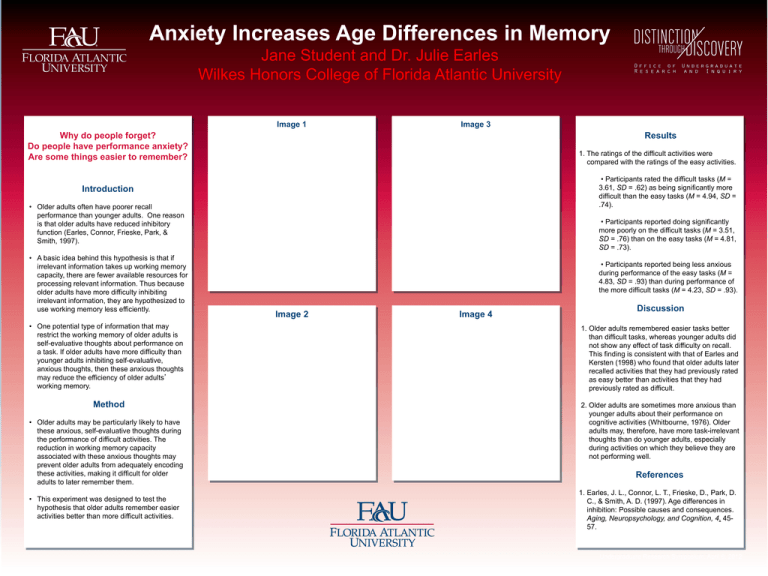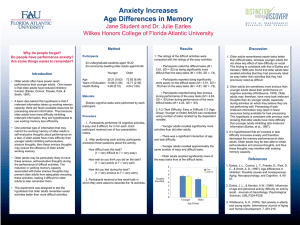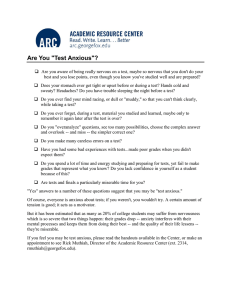Anxiety Increases Age Differences in Memory Why do people forget?
advertisement

Anxiety Increases Age Differences in Memory Jane Student and Dr. Julie Earles Wilkes Honors College of Florida Atlantic University Image 1 Image 3 Why do people forget? Do people have performance anxiety? Are some things easier to remember? Results 1. The ratings of the difficult activities were compared with the ratings of the easy activities. • Participants rated the difficult tasks (M = 3.61, SD = .62) as being significantly more difficult than the easy tasks (M = 4.94, SD = .74). Introduction • Older adults often have poorer recall performance than younger adults. One reason is that older adults have reduced inhibitory function (Earles, Connor, Frieske, Park, & Smith, 1997). • A basic idea behind this hypothesis is that if irrelevant information takes up working memory capacity, there are fewer available resources for processing relevant information. Thus because older adults have more difficulty inhibiting irrelevant information, they are hypothesized to use working memory less efficiently. • One potential type of information that may restrict the working memory of older adults is self-evaluative thoughts about performance on a task. If older adults have more difficulty than younger adults inhibiting self-evaluative, anxious thoughts, then these anxious thoughts may reduce the efficiency of older adults’ working memory. Method • Older adults may be particularly likely to have these anxious, self-evaluative thoughts during the performance of difficult activities. The reduction in working memory capacity associated with these anxious thoughts may prevent older adults from adequately encoding these activities, making it difficult for older adults to later remember them. • This experiment was designed to test the hypothesis that older adults remember easier activities better than more difficult activities. • Participants reported doing significantly more poorly on the difficult tasks (M = 3.51, SD = .76) than on the easy tasks (M = 4.81, SD = .73). • Participants reported being less anxious during performance of the easy tasks (M = 4.83, SD = .93) than during performance of the more difficult tasks (M = 4.23, SD = .93). Image 2 Image 4 Discussion 1. Older adults remembered easier tasks better than difficult tasks, whereas younger adults did not show any effect of task difficulty on recall. This finding is consistent with that of Earles and Kersten (1998) who found that older adults later recalled activities that they had previously rated as easy better than activities that they had previously rated as difficult. 2. Older adults are sometimes more anxious than younger adults about their performance on cognitive activities (Whitbourne, 1976). Older adults may, therefore, have more task-irrelevant thoughts than do younger adults, especially during activities on which they believe they are not performing well. References 1. Earles, J. L., Connor, L. T., Frieske, D., Park, D. C., & Smith, A. D. (1997). Age differences in inhibition: Possible causes and consequences. Aging, Neuropsychology, and Cognition, 4, 4557. Undergraduate Research Symposium, April 6, 2012

